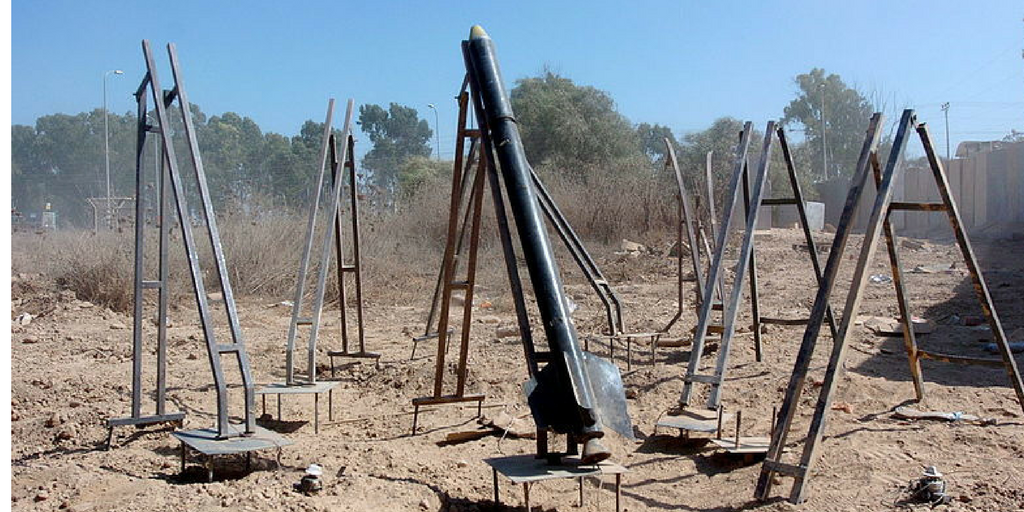Palestinian statehood & a secure Israel are mutually exclusive goals. This was always the accepted wisdom in Israel – until the discourse was hijacked by the tyrannical diktats of politically correct dogma
We must all work toward that future: two states for two peoples. One Jewish with secure and defensible borders, and one Palestinian with its own flag and its own future, Howard Kohr, March 4, 2018.
Last Sunday, in front of 18,000 animated pro-Israel activists, AIPAC’s CEO, Howard Kohr delivered a polished and carefully-crafted address—totally torpedoed about midway through his 25 minute speech by a few seconds of politically-correct claptrap.
After meticulously cataloguing the daunting dangers facing Israel and the nefarious nature of her unscrupulous adversaries—from the Shia “puppet master”, Iran, and its terror proxy Hezbollah in the North to the brutal Sunni Hamas and the assorted Salafi Jihadi renegades in the South—Kohr went on to propose…giving them precisely what they are allegedly clamoring for—at least initially: A self-governing Arab entity in the East, dominating Israel’s densely populated coastal plain, abutting the trans-Israel highway and overlooking Israel’s only international airport.
Mutually exclusive goals: Palestinian statehood and a secure Israel
I do not wish to dwell on all the logical inconsistencies, factual inaccuracies and glaring non-sequiturs that marred the second half of Kohr’s impeccably delivered speech. Rather, I shall focus on only one: His call for a state for the Palestinians “with its own flag and its own future” on the one hand; and “secure and defensible borders” for Israel on the other.
After all, Palestinian statehood and a secure Israel are mutually exclusive goals. Indeed, this was always the accepted wisdom in Israel – until the discourse was hijacked by the tyrannical diktats of politically correct dogma.
Thus, it was none other than Nobel laureate, the late Shimon Peres, who warned: If a Palestinian state is established, it will be armed to the teeth. Within it, there will be bases of the most extreme terrorist forces, equipped with anti-tank and anti-aircraft shoulder-launched rockets, which will endanger not only random passers-by, but every airplane and helicopter taking off in the skies of Israel and every vehicle traveling along the major traffic routes in the coastal plain .- “Tomorrow is Now” (Keter publishers), pp. 232, 255.
This dour caveat was echoed by Israel Prize laureate, Prof. Amnon Rubinstein, who also served as Education Minister on behalf of the far-Left Meretz faction: “…Israel, small and exposed, will neither be able to exist nor prosper if its urban centers [and] its vulnerable airport…are shelled…this is the terrible danger involved in the establishment of a third independent sovereign state between us and the Jordan River. – ‘The Pitfall of a Third State’, Haaretz, Aug. 8, 1976.
 These two citations convey, with chilling accuracy, the grave perils to which Israel would be exposed if a Palestinian state were ever established on the commanding hills overlooking the country’s coastal megalopolis, where about 80% of the country’s civilian population and commercial activity are located.
These two citations convey, with chilling accuracy, the grave perils to which Israel would be exposed if a Palestinian state were ever established on the commanding hills overlooking the country’s coastal megalopolis, where about 80% of the country’s civilian population and commercial activity are located.
These dangers are dramatically illustrated by the following series of photographs, shot from locations inside the territory designated for any future Palestinian state.
All taken on January 31, 2018, using a Canon 7D Mark II camera, fitted with a Sigma Sport 150/600 lens, from just east of the Palestinian-Arab villages of Rantis and Al-Lubban, located about 5 km across the pre-1967 “Green Line” (see map), they vividly convey how vulnerable and exposed Israel would appear through the binoculars of any Palestinian “intelligence officer” (a.k.a. terrorist) perched on those heights.
Ben Gurion Airport hopelessly exposed
The following four photographs depict how utterly exposed the installations and aircraft – both on the ground and in the sky – would be to any hostile forces–even lightly armed–deployed on the highlands east of Israel’s densely populated coastal plain.

Above: Israel’s only international airport, Ben Gurion – as seen from just east of the Palestinian-Arab villages of Rantis and Al-Lubban (buildings seen in foreground), showing the new control tower, the passenger terminal, the duty-free area and planes docking for embarkation/disembarkation.

Above: Israel’s only international airport, Ben Gurion – as seen from just east of the Palestinian-Arab villages of Rantis and Al-Lubban showing numerous civilian planes on the tarmac.

Above: A plane taking off from Ben Gurion, Israel’s only international airport – as seen from just east of the Palestinian-Arab villages of Rantis and Al-Lubban.

Above: Arkia airliner taking off from Ben Gurion airport – shot from just east of the Palestinian-Arab villages of Rantis and Al-Lubban. (Camera: Canon 7D Mark II with Sigma Sport 150/600 lens).
A tempting target: Israel coastal urban sprawl
The next five photographs convey starkly what a tempting target the office buildings, prestigious apartment blocks, teeming recreational and entertainment centers and central transport arteries (rail and road) would be if the IDF were to evacuate areas earmarked for a future Palestinian state.

Above: Tel Aviv skyline showing the iconic Azrieli high-rise complex, adjacent to the Ministry of Defense and IDF’s GHQ, the trans-Tel Aviv Ayalon Highway and the busy HaShalom railway station; also seen is Kirya (Ha-Yovel) Tower, with 28 of its 42 floors occupied by government offices, and the nearby Azrieli Sarona Tower, the tallest building in Tel Aviv – as seen from just east of the Palestinian-Arab villages of Rantis & Al-Lubban.

Above-Enlarged: The Azrieli high-rise complex, adjacent to the Ministry of Defense and IDF’s GHQ, the trans-Tel Aviv Ayalon Highway and the busy HaShalom railway station; also the Kirya (Ha-Yovel) Tower, with 28 of its 42 floors occupied by government offices, & the Azrieli Sarona Tower, the tallest building in Tel Aviv.

Above: Tel Aviv skyline showing the luxury apartment complex, Park Tsameret, adjacent to the trans-Tel Aviv (Ayalon) highway and the busy Savidor Central railway station – as seen from just east of the Palestinian-Arab villages of Rantis and Al-Lubban.

Above: Enlarged: North Tel Aviv skyline showing the luxury apartment complex, Park Tsameret, adjacent to the trans-Tel Aviv (Ayalon) highway and the busy Savidor Central railway station.
 Above: North Tel Aviv, Ramat Gan, Bnei Brak sky-line showing the Reading Power Station chimney, adjacent to the Tel Aviv Port recreation area, and the 4 BSR Towers, which house many upmarket law firms, medical facilities, hi-tech offices and numerous busy restaurants– as seen from just east of the Palestinian-Arab villages of Rantis & Al-Lubban.
Above: North Tel Aviv, Ramat Gan, Bnei Brak sky-line showing the Reading Power Station chimney, adjacent to the Tel Aviv Port recreation area, and the 4 BSR Towers, which house many upmarket law firms, medical facilities, hi-tech offices and numerous busy restaurants– as seen from just east of the Palestinian-Arab villages of Rantis & Al-Lubban.
The imperative to “think ahead”
In the opening minutes of his address, Kohr observed: “…there have been many threats [to Israel]; many more ready to make them. So it is our purpose and mission to always think ahead, prepare for any possibility…”
And indeed we should.
One of the “possibilities” we should “prepare for” is the (highly plausible) prospect that any land vacated by Israel and the IDF will fall into the hands of vehemently hostile elements – as happened every time Israel has relinquished territory to Arab control—whether in the North in South Lebanon; in the South in the Gaza Strip, and even in Sinai, now descending into the depravity of Jihadi brutality…
Of course, once Israel evacuates the strategically vital highlands of Judea-Samaria to facilitate the establishment of a Palestinian state “with its own flag and its own future”; there is no way that Israel can have “secure and defensible borders”—for there is no way it can ensure that they will not fall into the very hands of those who Kohr so excoriated in his speech—including elements controlled by the terror “puppet masters” in Tehran.
So we should all heed Kohr’s wise counsel and make it “our… mission to always think ahead, prepare for any possibility…”
So should Kohr!



![800px-IDF_Rocket_Hits_Fuel_Bladder_Al_Asad_Feb_20_2005[1]](https://israelrising.com/wp-content/uploads/2018/03/800px-IDF_Rocket_Hits_Fuel_Bladder_Al_Asad_Feb_20_20051.jpg)

